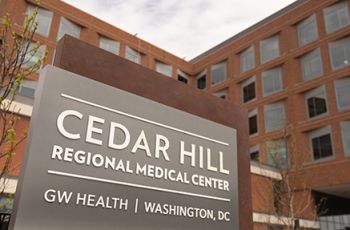
With a five-year, $2.17 million grant from the National Institutes of Health, Wenge Zhu, PhD, associate professor of biochemistry and molecular medicine at the George Washington University School of Medicine and Health Sciences, is aiming to help ovarian cancer patients overcome resistance to platinum drug therapies by targeting the Fanconi anemia (FA) pathway.
Ovarian cancer is the deadliest gynecological cancer in the United States and the fifth leading cause of death among female cancer patients, according to the American Cancer Society. As part of their treatment, ovarian cancer patients typically receive platinum drug-based chemotherapy. Most respond to the treatment at first and achieve remission, but over time, up to 80% of patients develop a resistance to platinum-based drug therapies and are less likely to survive.
The FA pathway, however, may offer an answer. The pathway is critical for repairing DNA interstrand crosslinks, or ICLs, and increased FA signaling activity is one of the major mechanisms behind platinum-drug resistance in ovarian cancer (PROC).
“The role of the FA pathway in ICL repair has been well studied over the last decade, but what’s poorly understood is the regulatory switch from a platinum drug-caused stalled replication fork to FA signaling initiation and how the FA is activated in PROC cells,” said Zhu. “To find the mechanism regulating the initiation of FA signaling, we conducted preliminary studies demonstrating that And-1 is critical for the activation of FA signaling and FA-mediated platinum drug resistance in ovarian cancer.”
Zhu hopes to determine the mechanism behind how And-1 and Fanconi anemia complementation group M, which helps repair ICLs, regulates FA signaling and platinum resistance in PROC.
“With this grant, we will be able to determine a novel mechanism regulating platinum drug resistance and evaluate the effects of a potential new drug to overcome platinum resistance in ovarian cancer,” Zhu said. “These findings can lead to the development of an innovative therapeutic strategy for the treatment of platinum drug-resistant ovarian cancer patients.”


